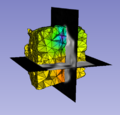Difference between revisions of "2017 Winter Project Week/Support for volumetric meshes"
From NAMIC Wiki
| Line 60: | Line 60: | ||
* Display information about the model type (surface or volumetric) for the user to be able to distinct it in the module widget. | * Display information about the model type (surface or volumetric) for the user to be able to distinct it in the module widget. | ||
* Test with more cases, like fiber bundles etc... (changes could have a lot of impacts because there were changes to vtkMRMLDisplayNode and vtkMRMLModelNode. Make sure the updated API stays backward compatible). | * Test with more cases, like fiber bundles etc... (changes could have a lot of impacts because there were changes to vtkMRMLDisplayNode and vtkMRMLModelNode. Make sure the updated API stays backward compatible). | ||
| + | * Add creation, conversion and editing abilities (adapt former modules). | ||
|} | |} | ||
Revision as of 16:08, 13 January 2017
Home < 2017 Winter Project Week < Support for volumetric meshesPrevious works
Results
Key Investigators
- Alexis Girault (Kitware, Inc.)
- Curtis Lisle (KnowledgeVis, LLC)
- Steve Pieper (Isomics, Inc.)
Project Description
| Objective | Approach and Plan | Progress/Results | Next steps/Future work |
|---|---|---|---|
|
From top priority to possible future work:
|
|
|
|
Background and References
- IA_FEMesh (Slicer 3) : https://www.slicer.org/wiki/Modules:IA_FEMesh-Documentation-3.6
- BodyCentricCubicMesh module : https://www.slicer.org/wiki/Documentation/Nightly/Modules/BodyCentricCubicMesh
- MeshCompression module : https://www.slicer.org/wiki/Documentation/Nightly/Modules/MeshCompression
- CleaverExtenstion : https://www.slicer.org/wiki/Documentation/Nightly/Extensions/CleaverExtension
- vtkUnstructuredGrid : http://www.vtk.org/doc/nightly/html/classvtkUnstructuredGrid.html




